The Summer 2011 Anime Preview Guide
Carl Kimlinger
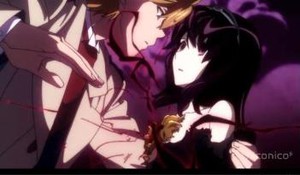
The Mystic Archives of Dantalian
Rating: 4
Review: The opening scene of yet another young boy befriending yet another mysterious, potentially magical girl isn't promising, but just past the initial tripe lays an intriguing adventure steeped in the magic of the written word. After meeting Huey as a small child, we are reunited with him as a young man. Huey's bibliomaniac grandfather has just died, leaving his enormous collection of books to his ex-pilot grandson. Huey accepts, but only because he thinks it might help him find something called the Mystic Archives of Dantalian. He arrives to find his grandfather's collection under the protection of a rather high-handed girl named Dalian. Dalian was a ward of his grandfather's, and when Huey leaves to visit Conrad, the man widely thought to have murdered the old man, she insists on tagging along. They arrive at Conrad's estate to find it in ruins; a consequence, Dalian claims, of Conrad reading a book that he wasn't supposed to.
There's much in Dantalian that is worn and predictable. No one's really going to be blown away to discover that a girl named Dalian is tied up with Dantalian's archives, and the nature of her tie has a suspiciously familiar ring to it. Where was it we saw a girl with tomes of forbidden knowledge sealed within her? The idea that books hold untold power isn't exactly fresh either, and neither is imperious little Dalian. We've seen her and Huey's relationship countless, endless times before. It's a testament to the series' other strengths that ultimately none of that really matters. It's one handsome production, with a real nose for atmosphere and an excellent sense of time and place (1920s England). It also has the overwhelming advantage of starring an actual grown-up. You've heard of them right? You know: resourceful, responsible people who are old enough to buy alcohol and make decisions for themselves? Its belief in the power of language (ever seen a dragon slain with poetry?) is pretty much just gravy.
The Mystic Archives of Dantalian is available streaming at NicoNico.com and Crunchyroll.

Manyū Hiken-chō
Rating: 1
Review: The season is almost over and the race for last place is a dead heat. On one side is Twin Angel: Twinkle Paradise, a keening kawaii drill to the intellect. On the other: Manyū Hiken-chō, a lake of stinking, misogynistic refuse. Ah, choices, choices. Welcome to the Edo Period. Japan is at peace and society is ruled not by money or bushido, but by big boobs. Boobs mean everything: power, wealth, prestige. One clan controls the boobs and thus the nation: the Manyū. They're a vicious bunch whose favorite pastime is boob-hunting and whose secret sword technique is the fabled breast cut—both of which are exactly what they sound like. Chifusa Manyū, the young heir to the clan, runs away from the clan one day, their secret scroll in hand. She is hotly pursued by elder sister and chief boob-hunter Kagefusa. When finally cornered, Chifusa manifests the breast-stealing ability that made her the clan's heir and steps out into the world to fight boob inequality.
As silly as all of that sounds, Hiken-chō is no lark. It dresses its goofy premise in vicious sexual violence and casual misogyny while only occasionally allowing itself to smile at its inherent ridiculousness. There're two graphic rapes in the first half of this episode alone, and women lament the loss of their breasts—by violence, by the way—as if bust size really were the measure of their sex's worth. When one woman loses her breasts her parents die, her fiancé leaves her, and she's forced to live as a hermit. That's right, all you mastectomy survivors, go live in shame like you're supposed to. The preposterousness of it all does take a bit of the edge off, but it leaves a vile taste in your mouth regardless. This idea would never have flown had it involved men and penises instead of women and breasts—a fact that leaves perhaps the foulest taste of all.
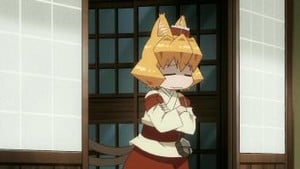
Cat God
Rating: 3
Review: One look at the squiggly blobs that Cat God uses as side characters and you can tell that it was made by the same people who made Di Gi Charat. It's probably no coincidence that its star is a freeloading catgirl. Cat god Mayu used to live in heaven, or wherever it is that gods live, but she pulled one prank to many and her strict mother stripped her powers away and flung her down to the mortal world. Her powers are now limited, but things aren't so bad. She lives with (or more accurately, off of) a kind human girl named Yuzu and spends most of her time playing video games. The town is crawling with other deities, including a fox god who is clearly smitten with Yuzu and a bickering pair of warrior goddesses who are clearly smitten with Mayu. When a dreaded Poverty God hits town they all band together to boot the nasty thing out, but find that doing so is no easy task—not when Yuzu has adopted the cute little guy (girl).
Cat God shares a lot more with Di Gi Charat than just its background art and main character's species. There's its eye for non-exploitative uber-cuteness, and its fondness for undercutting it with Mayu's sarcastic sangfroid. Mayu resembles nothing so much as a slightly older Dejiko: still lazy and sort of selfish, but also confident, self-possessed and a tiny bit more considerate and responsible. Far more importantly, though, the series shares with Di Gi Charat its paradoxically laid-back and hyperactive feel, a druggy sense that it is both indolent and surreally out of control. Tanks are rolled out when the Poverty God comes to town, much running, fighting and general chaos is indulged in as we leap around town, and yet the series and its characters treat everything with a careless matter-of-factness that kills any urgency events might have. The result, like Charat, is both relaxing and fun. It's also without a semblance of substance, but why be picky?
Cat God is available streaming at Crunchyroll.

Uta no Prince-sama episode 2
Rating: 2 ½
Review: Prince-sama begins the process of beefing up its male cast, taking as its first beneficiary (victim?) outgoing nice guy Otoya Ittoki. School has begun in earnest and the would-be idols and songwriters of Saotome Academy are given their first big assignment: to compose, write and perform a song in randomly assigned singer-songwriter pairs. Haruka is teamed with Ittoki. At first she's glad to be paired with one of the guys who helped get her into the school, but when it comes out that she can't even read music, she starts worrying that she may be holding Ittoki back. Nice guy that he is, Ittoki disabuses her of that notion but quick, and they get down to the work of putting together something that'll knock the skeptics for a loop. In the meantime, Haruka has discovered that the man she first took to be her idol Haruka is instead Haruka's embittered twin brother Ishinose.
Frankly the extra screen-time this episode gives to Ittoki isn't all that beneficial. He loses none of his one-note cheeriness, and his tender scenes with Haruka are so smothered in cheese you could make quesadillas with them. More advantageous is the series' move away from the parading of pretty boys and towards the struggles of making music and surviving school. Haruka embarrassing herself in front of her peers (cue the bitchy snickering) is loads more interesting than Haruka meeting and instantly wooing yet another male stereotype. There're even a couple of grains of truth in the scenes of her agonizing over her fledgling work, and a few actual feelings as well. The bland pop that results doesn't justify the fuss made over it, and really, no one will ever mistake the series for anything but the flesh market that it is, but at least it doesn't hurt to watch any more. Which makes it just that much easier to appreciate the fantastic artwork.
Uta no Prince-sama is available streaming at NicoNico.com.

Yuruyuri Episode 2
Rating: 2 ½
Review: It seems everyone and their mother these days is opening their anime series with bouncy pop songs sung in chorus by their female casts. Such songs can be a lot of fun, as anyone who's seen the good-humored openings of series like Galaxy Angel and Kemeko Deluxe! can tell you. The problem is that so few series get it right. Most just assume that a hyperactive beat and lots of squeaky harmonizing are all that's needed. Yuruyuri is one of these. That may seem like a petty thing the pick on, but it's indicative of a larger issue. Masahiko Ohta is one of the few to have gotten the bouncy pop chorus thing right, notably in Mitsudomoe, which mixed visual wit with a genuinely memorable song. Yet here in Yuruyuri he churns out a lazy, generic bore of an opening. The same could be said for the series overall. Ohta has turned out truly excellent girl-centered, meaningless slice-of-life comedies in the past. Minami-ke was filled with inspired physical comedy and memorable character shtick; Mitsudomoe curdled the genre's sweet tropes with vicious sibling rivalry and spectacularly vulgar gags. Yuruyuri just follows the playbook, content to be frivolous and harmless and only mildly humorous. That is an enormous letdown. This episode may focus on new characters (student council members Ayano, Chitose, Sakurako, and Himawari). The yuri content may shoot through the roof thanks to the rivalries-cum-crushes that the new characters introduce. We may have grown interested enough in the characters to finally tell them apart and may find Sakurako and Himawari's double-tsundere relationship pretty funny. But the disappointment still remains, and given the series' overall slightness, it's the feeling that lingers longest.
Yuruyuri is available streaming at Crunchyroll.

R-15
Rating: 3
Review: If your expectations, like mine, have been sufficiently depressed by the brain-dead, imagination-free tripe that is too often passed off as romantic comedy, then you may actually find yourself sort of enjoying this ribald comedy about an odd boy in a special school. Taketo Akutagawa is an odd boy because of his natural aptitude for literary pornography. Only in middle school, he is already an accomplished author of erotica. That didn't go over well at his old school, but his new one is different. It's Inspiration Academy, a school for youngsters with idiosyncratic gifts. Other students don't necessarily understand Taketo's genius, but at least they acknowledge it as such. One of the ones who doesn't understand is Taketo's crush, clarinet prodigy Fukune Narukara. That doesn't stop Taketo from trying to get closer to her, though when he does he gets this uncontrollable urge to write clean, mainstream fiction. Freaky.
Fair warning: Taketo is a porn author and a teen boy, which is creepy enough on its own, but also means that he has a very active and very graphic imagination. If you aren't at least braced for exchanges of bodily fluids, you may want to take a pass on R-15. And if you're on the other side of the fence, fair warning again: there's a lot of irritating censorship as well. If you can tolerate both, then you'll find a pretty funny, reasonably sweet comedy built around a fairly original idea. That's a lot of qualification, I know, but for good reason. The show isn't trying to revolutionize anime; it's perfectly satisfied with being "good enough." So we get loads of overblown fan-service, a couple of hackneyed romantic misunderstandings, and piles of characters that just walked off of a rom-com assembly line somewhere, but also Taketo's hilariously excessive porn writing, a romantic interest who isn't a balloon-chested freak of nature, and a romance in which the boy is so immersed in sex that love has the opposite of its intended effect. That doesn't suck.
R-15 is available streaming at NicoNico.com and Crunchyroll.
A Dark Rabbit Has Seven Lives
Rating: 2
Review: No, the first episode doesn't explain what that bizarre title means, but it does give us enough of a taste of the show's many shortcomings that we won't be sticking around to find out. In a playground some years in the past, young Taito makes a pact with a pint-sized vampire named Himea. Flash forward to the present. Taito is a laid-back high-school student with recurring dreams about a girl-child vampire but no memory of her existence. He has a sort-of girlfriend in cheerful, supportive Haruka, but feels strangely unattached to her. He only remembers why when he gets a face-full of speeding semi while rescuing a girl from an oncoming truck. There's nothing like living through your own decapitation to jog our memory. Finally aware that his true love is languishing in limbo, he rushes to meet her, but others are rushing there as well. And they don't want to cuddle.
If you had to finger one culprit for Dark Rabbit's failure, it'd probably be its characters. Taito has the personality of a mildly gifted turnip, Himea is given no chance to evolve past the prefab fetish stage, Haruka is a bowl of sweetly ingratiating oatmeal, and Gekkou, the primary villain, is an ass whose misogyny the series seems oddly disinclined to condemn. That alone warrants dismissing the series out of hand. But why limit ourselves? There's also the clunky dialogue and the blah visuals to complain about. And the choppy pacing, and the glaringly unnecessary panty-flashes, and the suspect voice acting. The series has plenty of mysteries to solve—who Gekkou really is, why Taito can't remember Himea, why Himea spent nine years in the Phantom Zone hobnobbing with General Zod—but instead of adding intrigue they just make the show feel sloppy and incomplete. The dark humor of the decapitation scene and a mild flair for the melodramatic are all the series can boast of at this point, and that isn't nearly enough to excuse everything else.
A Dark Rabbit Has Seven Lives is available streaming at NicoNico.com and Crunchyroll.
The Idolm@ster
Rating: 2
Review: Thirteen girls struggle to enter the music industry and we yawn as Namco's idol simulation game hits the small screen (again—it was previously adapted as Idolm@ster: Xenoglossia). Studio 765 is a small, apparently ill-funded production agency for idol singers. Ritsuko Akizuki, a former idol herself, is the company's sole producer, shepherding its twelve hopefuls through the arduous task of becoming disposable pop singers. Primary among them is all-around nice girl Haruka Amami, but the list also includes boyish Makoto Kikuchi, rascally twins Ami and Mami Futami, fractious rich girl Iori Minase, shy Yukiho Hagiwara, serious singer Chihaya Kisaragi, pet-loving Hibiki Ganaha, cheerful Yayoi Takatsuki, fortune-loving Azusa Miura, lazy Miki Hoshii, and deliberately mysterious Takane Shijou. Together they goof around the office, attend auditions, and occasionally perform.
Idolm@ster spends most of its first episode establishing the above list. It uses a faux-interview gimmick to run through the names and salient background and personality traits of each member of its extensive female cast. The result is an incredibly boring episode. And a laundry-list of common character types. The fact that each girl can be described with a single word or phrase is not a coincidence; that's all the personality they have. Each girl has a signature look and a single quirk, maybe two if they're lucky. That isn't much of a foundation to build their charm on, and they respond by having none. To a girl they are dull and uninteresting. Given that the number of girls coincidentally matches the number of episodes in an average half-season show, it's pretty safe to assume that the series will devote an episode to each character, but it's hard to see that making a difference, and the prospect of spending an entire half-hour with each of these two-dimensional wonders is a grim one. It's easy to see why Xenoglossia opted to pull its plot from its own rear. Even a rear-end is a better source than the original game.
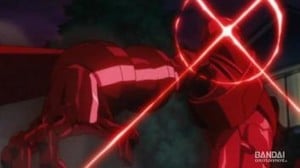
Sacred Seven
Rating: 3 ½
Review: If there's one thing you can count on Sunrise for, it's a solid orthodox action series. Sacred Seven is nothing if not orthodox. Its hero, Alma, has vast inner powers that he is desperately trying to distance himself from. He gets mixed up in mess involving modern corporations and ancient magical rock-beasts that forces him to combine his powers with those of a mysterious girl in order to tap into even greater powers. How's that for orthodoxy? From a brief overview, the series could be just about any superpowered-teen-fights-evil anime that ever was. The devil, as ever, is in the details. Alma is tall, handsome and decent, which makes the interest of girls like slightly goofy rock club member Wakana (yes, there's a rock club) and superpowered rich girl Ruri perfectly understandable. His enemies, sentient rock juggernauts with as little regard for human life as earthquakes or rockslides, are suitably threatening, if not terrifying. His powers are pretty darned cool and also have an edge of uncontrolled bloodlust that makes them more than a little frightening. Lead screenwriter Shin Yoshida in the meantime fills the script with a little bit of something for everyone: oodles of destruction, lurking mysteries, school drama, a pinch of romance, maid commandos. And Sunrise coats it all in a heavy layer of gloss while Yoshimitsu Ohashi keeps things moving at brisk clip, without rushing any of the important scenes. It may not have the instant hook or the healthy humor of Tiger & Bunny, but it's as efficient and entertaining as you could desire, and there's plenty of room for it to grow.
Sacred Seven is available streaming at Crunchyroll.
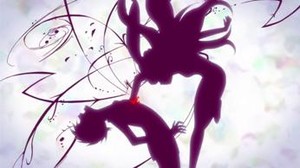
Mawaru Penguindrum
Rating: 4
Review: After demonstrating a unique strength of vision in Revolutionary Girl Utena and, especially, Revolutionary Girl Utena: The Movie, Kunihiko Ikuhara left the director's chair behind, seemingly permanently. In the decade-plus that followed he rarely dipped more than a toe into any given anime. So news that he was returning to direct Mawaru Penguindrum was welcome indeed, wonky name notwithstanding. Whether the series itself can live up to expectations is far from certain, but genuine auteurs are so damnably rare in anime that the return of one to the fold is reason for celebration no matter what the ultimate outcome.
At the center of Peguindrum lays the Takakura family; or rather, what's left of it. Kan, Sho and Himari are orphans who live in a colorful shack next to an equally colorful playground. Kan and Sho are very protective of Himari, and with good reason: she's dying from what appears to be an inoperable brain condition. When her condition catches up to her while visiting the aquarium, the two brothers are inconsolable. When a cheesy souvenir from the same aquarium returns her to life, they are just as overjoyed. But nothing comes free, least of all miracles, and when they receive a trio of magical penguins in the mail, the chickens, so to speak, come home to roost.
The surreal premise is pure Ikuhara, as are the bizarre visual flourishes, confounding philosophical voice-overs, and ludicrous yet perfectly straight-faced humor. Anyone familiar with his earlier work will not be surprised to learn that the show is art-directed to perfection, that it is simmering with sublimated sexual impulses and perverse affections, or that it puts all of those pet obsessions and stylistic quirks together in a way that is confusing and alienating, yet dreamily logical. There's no guarantee that it won't self-destruct they way Utena often threatened to, but until such a time as it does, the show will remain Ikuhara's seductive, subtly menacing circus, and we'll be only too glad to join.

No. 6
Rating: 3 ½
Review: The future is a complex thing in No. 6; too bad its relationships aren't equally so. It is indeed the future. What remains of the world after the habitable landmass is decimated by an unspecified apocalypse is divided into six city-states, of which Number 6 is naturally the sixth. Within its polished confines lives curious, highly intelligent youngster Shion. One of the city's elite—being a genius has its perks—he lives in luxury with his attentive mother and equally brilliant but far more aggressive sort-of girlfriend Safu. Rat has none of that. Once imprisoned, now gunshot and on the lam, Rat breaks into Shion's bedroom and tries to terrorize him into giving him shelter. He needn't have bothered. Shion is terror-proof; he loves the new experience of having an intruder to hide and care for, and provides shelter and medical attention without even being asked. Of course, the government won't look kindly on that.
No. 6 draws its inspiration from the cautionary dystopias of the likes of Orwell and Bradbury, tales of futures in which peace and order are maintained at a grievous human cost. The series builds its dystopia subtly and carefully. The absolute power of the government is never stated aloud; merely implied via the unnaturally sanitary environs, the ID bracelets required to move around the city, and the demanding "public service" notices sent to its citizens. Unfortunately, the show doesn't extend the same care to everything. The instant friendship between Shion and Rat in particular feels ill-written and forced; it's far too reliant on Shion's increasingly unrealistic reactions to Rat's aggression and sports a few thoroughly unnecessary hints of homoeroticism. Shion is a refreshingly different male lead despite his less believable quirks, and Rat is no slump himself, but the bond between them just doesn't ring true. Still, the show is an unusually thoughtful work of science fiction, and possesses fine visual instincts too boot, making it one of the season's more promising outings.
No.6 is available streaming at Crunchyroll.

Mayo Chiki!
Rating: 2 ½
Review: If you want a good romantic comedy, go elsewhere; if you want to learn how to kill a perfectly decent romantic comedy idea, tuck right in. Kinjirou Sakamachi is an ordinary high school student—or as ordinary as a boy with an allergy to girls whose mother is the world's strongest being can be. Subaru Konoe is an extraordinary butler. He serves Kanade Suzutsuki, the richest, prettiest girl in school, and is so handsome, athletic and refined that girls swoon at his very presence. Kinjirou and Subaru cross paths in the men's bathroom, where Kinjirou learns Subaru's secret: the Suzutsuki's butler is actually a girl. Unfortunately for Kinjirou, Subaru loses her job if anyone finds out she's a she, so she decides to kill him. Much pummeling later Kanade steps in...and makes things infinitely worse.
The idea of a cross-dressing butler may not be Shakespeare, but it does have a certain level of promise as the premise for an ecchi comedy. Think of the weird love triangles and romantic misunderstandings it could lead to. That promise is still alive, though battered, by the end of this episode, but the episode itself is so tone-deaf and devoid of imagination that there's no desire to tune in to see it fulfilled. That isn't to say that the series doesn't have its moments. It gets a couple of good laughs out of Kinjirou's immediate reaction to his discovery, and the subsequent battle is both suitably comical and surprisingly cool. Every glimmer of hope, however, is eventually smothered by an unholy combination of irritating character types (main offenders: Kanade and Kinjirou's little sister), horribly unnatural explanatory dialogue, stupid developments (guess who moves in with Kinjirou?) and unnecessary fan-service (when Kinjirou accidentally pushes Subaru down, her shirt pops open, hair falls down, and zipper comes undone—explain the physics of that). In the right hands Mayo Chiki! could have been a fun little romp; in these ones it's mostly just a pain.

Blood-C
Rating: 4
Review: CLAMP takes a shot at the Blood franchise and stamps it so indelibly with their mark that this third installment has more in common with, say, X than it does with the bleak original or its world-tripping sequel. Saya returns, though this time she is neither an unstoppable death machine nor an earnest amnesiac but a slightly clumsy, bespectacled shrine maiden. She helps her father, a stern, samurai-esque priest, with shrine duties, has a crush of sorts on the kind owner of a neighboring restaurant, and attends school with a goodly number of good friends. Maybe she's easily distracted (puppies!) and there is that elusive something hovering just outside the grasp of her consciousness, but, really, she's a very normal girl. Until nighttime that is, when she goes out and dismembers monsters with the cool efficiency of hardened killer.
Like any good CLAMP work, the first episode of Blood-C tells you pretty much nothing. The first episode spends the bulk of its running time establishing the kind of perfect, carefree life that begs to be punctured by a bloody katana and then puncturing it with a bloody katana. A classmate with a peculiarly intense gaze and that something that Saya can't quite grasp tell us that something is going on, but the series gives no indication what that might be, other than that it involves transforming monsters and lots of blood. The ladies of CLAMP are keeping their cards so close to their secretive chests that we can't even tell yet if this is a sequel to the previous incarnations or a complete reboot. Either way, the chances that it'll end up an over-plotted muddle are pretty good, but it will doubtless be a unique and thrilling muddle. And gorgeous. Tsutomu "xxxHolic"Mizushima nails CLAMP's peculiar surrealism without half trying, and he takes to brutal horror-action as if to the manner born.
Blood-C is available streaming at NicoNico.com

Usagi Drop
Rating: 5
Review: Surrogate parenting gets the grown-up treatment in this sweet and restrained familial drama from Production IG. We are introduced to Daikichi Kawachi as he is preparing for the funeral of his maternal grandfather. Upon arriving at his grandfather's house, he sees a small girl playing in the yard. When he asks his mother about her, he is more than a little surprised to learn that the girl is his grandfather's daughter. It seems the old man kept a few secrets before passing away. The girl, Rin, is shy and extremely introverted, but she takes an immediate, though half-fearful, liking to Daikichi. No one in Daikichi's family seems quite sure what to do with the illegitimate offspring of their patriarch, and when the inevitable meeting to decide her future turns to talk of orphanages, Daikichi takes it upon himself to raise the child.
Surrogate parenting is common enough in anime—with all of the orphans floating around, how could it not be? Where Usagi Drop differs from most is in approaching the relationship from the adult side, with adult patience and adult intelligence. This is a grown-up series in the best sense of the term: simple in its conception, straightforward in its presentation, yet complex in its treatment of characters and feelings. There is untold nuance in its near-wordless chronicling of the growing affection between Daikichi and Rin, and unspoken depth in the personalities of both would-be parent and damaged child. Even the most predictable acts have real, complicated motivations: Rin attaches to Daikichi both because he is responsive to her and because he resembles her father, and Daikichi adopts her as much out of anger at his selfish relatives as out of love or even responsibility. If you're on the lookout for something that could lift you up or break your heart, but never insult your intelligence, this is your best bet this season.
Usagi Drop is available streaming at Crunchyroll.

Twin Angel: Twinkle Paradise
Rating: 1
Review: I like to think of reviewing as a protective service for consumers. We're like secret service agents jumping in front of bullets, except instead of bullets, we block crap shows, and instead of presidents, we protect...you. This is me taking two barrels of double-00 buck shot to the guts for you. Don't let my sacrifice be in vain.
By day Aoi and Hazuki are normal middle-schoolers, but at night they don frilly skirts and puffy-sleeved tights to fight evil as the Twin Angels: magical thieves who steal only from other thieves. They are assisted by their school's kindly headmistress and Aoi's one-eyed butler, and when things get really bad—we're talking toxic gas that turns you into a catgirl bad—the masked Misty Knight comes riding to their rescue. It isn't a bad gig—thwart evil, do good, blow some stuff up, and get back in time to giggle and hold hands like best friends do.
Twin Angel is another in a growing body of anime works based on slot machines and pachinko games. One assumes a slot machine has a pretty minimal plot, so it isn't a terrible surprise that Twin Angel is a pastiche of other, better shows. But really, did it have to be such a wretched pastiche? The two overly-affectionate best friends, one a dim-witted genki girl and the other a soft-spoken model student, the shouted magical-girl moves, the &*#@ing masked guy who comes to the maidens' rescue as they teeter on the brink of defeat... it's like the series deliberately cherry-picked the worst that the magical girl genre had to offer. For god's sake, the Misty Knight fights with goddamned roses. The show might be trying for some kind of parody, but aren't parodies supposed to be funny? And it isn't really intended for kids—it's too self-aware—though it is as stupid and condescending as anything marketed at tykes. Which says a lot about the creators' opinion of us.
Twin Angel: Twinkle Paradise is available streaming at NicoNico.com.

Kamisama Dolls
Rating: 2 ½
Review: If you're to believe the entertainment industry, every small town has big, ugly secrets boiling beneath their apple pies and amber waves of grain...or in the case of anime, their shrines. In Kamisama Dolls, ancient magical forces brewing in a tiny mountain town threaten to spill over into metropolitan Tokyo. I guess that's better than cannibals and serial killers—the main afflictions of small-town America—but it ultimately isn't much more interesting. Kyouhei Kuga leaves the town in question after something unexplained drives him to abandon his duties as a Seki—a priest of sorts who bonds with one of the secret gods that occupy the village. He doesn't sever his ties completely—he has a major crush on fellow village expatriate Hibino—but he severs most of them. That is, until the day that his little sister Utao comes to town. Kyouhei foisted his responsibilities as a Seki off on Utao, and she's come to Tokyo in pursuit of another Seki, a psychotic killer with a big bone to pick with Kyouhei. Kyouhei has no choice but to help her out.
The problem with Kamisama Dolls is that there isn't a person in it that we give a dried turd for. Hibino is an improbably well-endowed nice-girl stereotype, Utao is a walking little-sister cliché, all diminutive spunk and ill-disguised brother complexes, and Kyouhei himself is cast from the exact same mold as every other decent yet reluctant hero in the universe. Apparently the magic forces in Kyouhei's village also suck away people's personalities. There're mysteries aplenty in Kamisama Dolls, as well as supernatural action, and even a pinch of romance, but it's hard to care about any of it when you're as attached to cast as you are to, say, your nail clippings. The fashionably nihilistic (and just plain fashionable) villain does nothing to change that. As for the concept of small-town mystics controlling robotic gods in a potentially galactic conflict, Shingu got there first, and with far more panache. And heart, and humor, and just about everything else except brooding angst.
Kamisama Dolls is available streaming at Crunchyroll.

Yuruyuri
Rating: 2 ½
Review: There are worse things than blowing half an hour watching Yuruyuri: waterboarding, for instance, or living in Forks Washington, or eating your veggies. Watching Yuruyuri isn't a particularly unpleasant experience. Neither, though, is it a particularly pleasant one. It's just another anime about the idealized after-school lives of schoolgirls that passes in a haze of quirky behavior and meaningless goofing off. The schoolgirls in question are the members of the school's Amusement Club, which is exactly what it sounds like: an after-school club the purpose of which is to have fun. Generally that means laying about reading and BS-ing. The club has three members: klutz Akari, token level head Yui, and crazed yuri fan Kyoko. They are eventually joined by Chinatsu, a cute little thing who bears a remarkable resemblance to Kyoko's favorite magical girl and thus ends up the object of her unwelcome affection. Together they do exactly what you'd expect Amusement Club members to do: laze around.
Yuruyuri isn't particularly energetic, or attractive, or fun, or funny. It has very little in the way of distinguishing characteristics. (In that way it's a lot like Akari, its main character, who actually has a running joke built around how little personality she has.) It's a rather haphazardly assembled collection of vignettes about silly girls doing silly things that does nothing that other haphazardly assembled collections of vignettes about silly girls doing silly things haven't already done, and probably done better. Yui adds a little yuri spice with her over-the-top love of girls and no one in the cast is particularly annoying, but you'd be better served by watching K-ON! again for the umpteenth time. Masahiko Ohata's aptitude for comedy (he's the guy behind the hilariously vulgar Mitsudomoe) could still rescue the show from yawnsville, but as this episode only has one real laugh—a glimpse of Akari's sister's room—the chances aren't looking good.
Yuruyuri is available streaming at Crunchyroll.
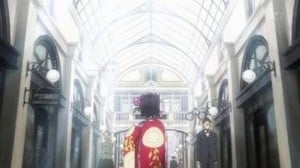
Ikoku Meiro no Croisée
Rating: 3 ½
Review: Set in the waning years of 19th-century Paris, Croisée is a slice of period life so gentle that it risks making no impression at all. It begins as elderly Parisian Oscar returns from a recent trip to Japan. He brings to his family's metalworking shop a variety of exotic souvenirs, among them a tiny, delicate girl named Yune. Yune comes from a family of attendants and she wants to ply her trade in Paris, so Oscar has brought her to the shop to work. Oscar's nephew Claude runs the shop and is not pleased by the new addition to his workforce. He doesn't understand Yune's Japanese ways and, dammit, he's done fine by himself so far. But cultural barriers and his own contrary personality cannot resist the charms of his selfless, hardworking charge for long.
As sweet and gentle as Croisée is, it's no surprise to see Junichi Sato's byline next to the script. The Sailor Moon director has devoted much of his later career to creating uplifting series that defy the conventional logic that shows must do something to be engrossing. That is clearly Croisée's aim, but unfortunately director Kenji Yasuda hasn't Sato's innate humanity or gift for poetry. Yasuda's work is neither as seductive nor as immersive as Sato's, and his emotional manipulations lack the class that the setting and overall tone require. Still, the series is kind, well-intentioned, and so very, very beautiful. It boasts a positively stunning line-up of art-directing talent, whose efforts yield a Paris that you can practically touch and smell. The contrast between the grey and brown environs and Yune's ravishing kimonos nicely highlights the culture clash at the series' heart, and Yune herself is so heartbreakingly cute that you're likely to return just to see her again. If the rest of the series ever elevates itself to the level of the artwork, we'll have a monster hit on our hands.

Uta no Prince-sama
Rating: 2
Review: It isn't impossible to create a good harem romance. Ai Yori Aoshi did it, and Fushigi Yugi was raw female wish-fulfillment and still kicked butt. But it is devilishly hard. How else to explain why some 90% of the genre is complete garbage? Prince-sama is not one of the 10%. Look at that title. There is no way anything with "Love 1000%" in the title is going to be anything but an embarrassment. As the title also suggests, Prince-sama is a reverse-harem show. It gathers its bundle of bishonen at Saotome Academy, a vocational school for idol singers. They are gathered around Haruka, a virginal songwriter with aspirations of writing for her favorite idol, the handsome but apparently frivolous Hayato. After some initial difficulty, she enrolls at Saotome with new best friend and roommate Shibuya and immediately begins bouncing off of a variety of pretty boys, all with their own quirks and rivalries and all mysteriously attracted to her.
It isn't the hormonal teen fantasy of having a herd of effeminate idol singers stampeding after a demure good-girl that stinks so much as how poorly executed (and disguised) that fantasy is. The series doesn't bother to really introduce its harem members, much less take the time to produce them with any kind of propriety; it just throws them at Haruka, one after the other. Literally in some cases. They end up so thinly written that to call them cardboard would be an insult to a really very sturdy packaging material. The show has a nice classical shojo flavor and lots of gorgeous colors, and Norio Wakamoto is loads of fun as the school's ludicrous headmaster, but that's no reason to endure the deluge of corn.
Uta no Prince-sama - Maji Love 1000% is available streaming at niconico.com.

Kami-sama no Memo-chō
Rating: 3 ½
Review: What do you get when you combine sleuthing with moe and anime's current fascination with NEETs? Something that isn't as gimmicky as it first sounds, it turns out. Because every anime needs a Joe Schmoe, we begin our story with Narumi Fujishima, a rootless high-school student who has perfected the art of blending in and keeping the world at arm's length. He's busy being bored and invisible at his newest school when forcefully outgoing Gardening Club member Ayaka drags him to meet her friends, who turn out to be a gang of proud NEET detectives. Narumi is instantly and involuntarily inducted into their ranks, where he soon gravitates towards the team's leader, a tiny, brilliant shut-in named Alice.
The comparisons with Gosick are obvious—the everyday guy falling in with a diminutive female sleuth may even become one of those peculiarly specific anime genres some day—but they aren't necessarily flattering. The loss of Gosick'sfanciful period setting is acutely felt, as is the loss of its dark humor, and Narumi and Alice have none of the chemistry that Gosick's Kazuya and Victorique have. The show does have its compensatory charms however. The structure of Alice's organization, with its stationary brain and exclusive team of foot soldiers, recalls Rex Stout's Nero Wolfe novels much the way Gosick's central duo recall Holmes and Watson. The mystery itself is a nasty piece of work; as much an unpleasant psychological study as a pure puzzle. Alice's foot-soldiers, who include a survival-gamer, a pachinko addict, and a professional womanizer, provide a certain level of charm, and while he's no Archie Goodwin, Narumi is smarter and more capable that your average anime schlub. Alice is unfortunately more a bane than a boon, what with her psychologically unsound mood swings and endless pseudo-intellectual prattling, but the series remains a promising little mystery nugget nonetheless.
discuss this in the forum (448 posts) |
this article has been modified since it was originally posted; see change history
back to The Summer 2011 Anime Preview Guide
Season Preview Guide homepage / archives